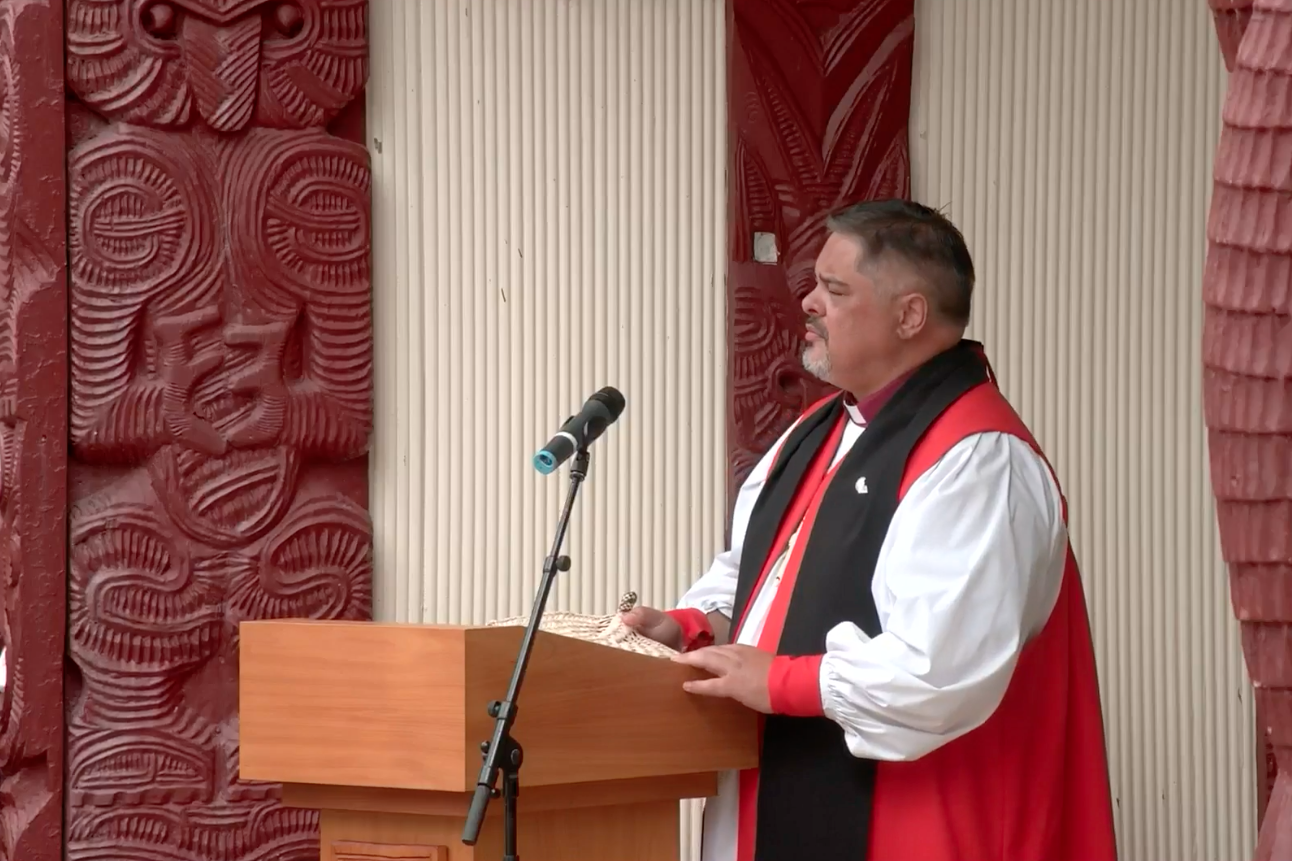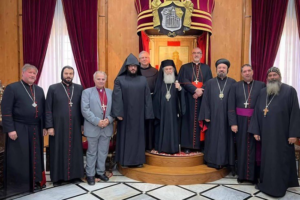“Tuhia ki te rangi, tuhia ki te whenua, tuhia ki runga i te ngākau o te tāngata, he aha te mea nui o tēnei ao, māku e kī atu, ko te aroha.”
Archbishop Don Tamihere opened the Hui-aa-Motu at Tūrangawaewae Marae on the weekend with a message of aroha, preaching from the scripture 1 Corinthians 13.
It has been reported that over 10,000 people poured into Ngāruwāhia for the hui, called for by Kiingi Tuheitia Pootatau Te Wherowhero VII to unify iwi from around the motu and hold the new coalition government to account.
But anyone who wasn’t familiar with Archbishop Don’s style of preaching may have been surprised to find themselves laughing along and even applauding. Videos of his kauhau that have been shared on social media have been liked by thousands in the days since.
Archbishop started his sermon by recalling watching his predecessor Archbishop Whakahuihui Vercoe at Waitangi in 1990.

Archbishop Whakahuihui Vercoe preaching at the sesquicentennial of the signing of the Treaty of Waitangi.
“He had been instructed by the organisers of that hui to offer a nice kauhau, to offer nice words to the monarch Queen Elizabeth II and to speak nicely about the paradise of racial relations that New Zealand had become. And so Bishop Vercoe, who on the journey to Waitangi had found his heart overwhelmed with aroha for the state that his people had found themselves within took heed of the instructions of the organising committee and he said ‘I stand by the waters of Waitangi and weep for what could have been’. And he turned to Queen Elizabeth II and he said ‘you have marginalised us, you have not honoured the treaty. I do not want to debate the treaty. I do not want to renegotiate the treaty. I want the treaty to stand firmly and to be used to make of us one nation’.”
Archbishop Don said it was now 34 years later and he wondered if the message needed to remain the same.
“Do we stand and speak to our kawanatanga [government] and say ‘you are marginalising us, you are not honouring the treaty’. How then should we respond because somebody somewhere has made the political calculation that they can vilify te iwi Maori, that they can demonise te iwi Maori, that they can renegotiate our existence and the taonga that we hold dear knowing that it will cost them nothing. And yet te iwi Maori, it will cost us everything. How then should we respond when hatred like this begins to simmer, begins to grow, begins to confront us.”
Archbishop Don said we were seeing the rise of hatred against indigenous and colonised people around the world.
“We see it in Ukraine, we see it in parts of Africa, we are seeing it in Gaza. I was speaking to my counterpart in Jerusalem Archbishop Hosam Naoum, a Palestinian Christian. The Mihinare church in the Holy Land is primarily Palestinian, primarily indiginous, and that shouldn’t surprise any of us because Jesus wasn’t a pākehā,” Archbishop said to applause from the crowd.
“Jesus was in raised in the mātauranga of his tipuna and his ancestor prophets and there found a new wānanga. He was born under brutal Roman colonisation and that wānanga gave him the strength to challenge their corruption and the marginalisation that they gave to the poor and the needy and the suffering. This wānanga is a wānanga that has captured indigenous peoples from around the world because we see that this whakapono and this wānanga when it’s in the hands of the coloniser becomes nothing but a tool for colonisation, but when this wānanga is in the hands of the indigenous it becomes something else. It becomes a tool for liberation. It becomes a tool for restoration. It becomes a tool to support our Tino Rangatiratanga and Mana Motuhake,” Archbishop said to more applause.
He said “this wananga is something we should bring into ourselves”.
“When and if we are confronted with hate e te iwi we have a choice. We can and we could respond in like kind. We could fill ourselves with the same bitterness, with the same resentment and the same condescension and the same negativity that we see being expressed to us by people that desire to vilify and to demonise and to marginalise te iwi Māori. We could fill our hearts with the same, but in the end all we would do is become the same as them.”
Archbishop told the crowd they’d been given a new choice and “that perhaps on this day of all days, alongside the call of the King” they could add the wānanga of aroha.
“Aroha is much more than simple sentiment. Aroha is the power that enables us to imagine a reality within which te iwi Māori flourishes. Aroha is the power than enables us to find the courage to stand up for righteousness and justice and to strive for peace. Aroha is a thing that can overcome all boundaries and can give us the strength and the endurance to walk this hikoi, to take the struggle to capture again our Mana Motuhake and to make sure that it never ever, ever is diminished ever again,” he preached.

Archbishop Don preaches with Rev. Zhane Tahau-Whelan, Rev. Ruawhaitiri Ngatai-Mahue, Ven Ngira Simmonds looking on.
“And why? Why would we turn to aroha? Because e te iwi, this kaupapa is not for us, it’s for our children and for our children’s children. Our tamariki and mokopuna are watching us.”
He said the young people were watching the way they would speak to each other throughout the hui and how they chose to act.
Kiingitanga chief of staff Ngira Simmonds, who is also a Mihinare priest, said Kiingi Tuheitia had requested Archbishop Don preach at the opening of Hui-aa-Motu and it had been seen by the office as a logical fit. Archbishop Don gave his first sermon on the grounds of Turangawaewae Marae and Archdeacon Ngira said he was someone Māori who weren’t of Mihinare faith had a lot of respect for. Archdeacon Ngira looking ahead to Ratana and Waitangi said the hui was the “beginning of something big”.

